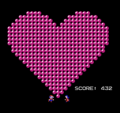Family BASIC: Difference between revisions
(Added information about Family BASIC v3.0) |
m (Added full date for 3.0 version) |
||
| Line 9: | Line 9: | ||
|Dis= | |Dis= | ||
}} | }} | ||
'''Family BASIC''' is an accessory for the [[Family Computer]] (Famicom) created by [[Hudson Soft]] and [[Wikipedia:Sharp Corporation|Sharp Corporation]]. It allowed users to create programs in the [[Wikipedia:BASIC|BASIC programming language]]. This accessory came with a special designed cartridge, keyboard, and the Data Recorder, similar in function to that of a [[Wikipedia:Commodore International|Commodore computer]] of that era. | '''Family BASIC''' is an accessory for the [[Family Computer]] (Famicom) created by [[Hudson Soft]] and [[Wikipedia:Sharp Corporation|Sharp Corporation]]. It allowed users to create programs in the [[Wikipedia:BASIC|BASIC programming language]]. This accessory came with a special designed cartridge, keyboard, and the Data Recorder, similar in function to that of a [[Wikipedia:Commodore International|Commodore computer]] of that era. On February 21, 1985, 3.0 version was released.<ref>https://www.retrogamer.net/retro_games80/famicom-family-basic/</ref> | ||
The keyboard plugs into a 15-pin expansion port on the front of the Famicom and the Data Recorder plugs into the back of the keyboard labeled "SAVE" and "LOAD." If one does not have the Data Recorder or spare cassette tape (or finds cassette tape technology too inconvenient), one can just use the microphone and headphone jacks of a computer or similar device to record the analog signal coming from the keyboard with their preferred audio recording program and then play it back when the game is requesting data to be loaded.<ref>https://www.youtube.com/watch?v=__9VYaKMwQI&t=12m45s</ref> | The keyboard plugs into a 15-pin expansion port on the front of the Famicom and the Data Recorder plugs into the back of the keyboard labeled "SAVE" and "LOAD." If one does not have the Data Recorder or spare cassette tape (or finds cassette tape technology too inconvenient), one can just use the microphone and headphone jacks of a computer or similar device to record the analog signal coming from the keyboard with their preferred audio recording program and then play it back when the game is requesting data to be loaded.<ref>https://www.youtube.com/watch?v=__9VYaKMwQI&t=12m45s</ref> | ||
Revision as of 13:55, June 8, 2020
This article is under construction. Therefore, please excuse its informal appearance while it is being worked on. We hope to have it completed as soon as possible.
It has been requested that this article be rewritten. Reason: Add discontinued release date
- This article is about the accessory for the Family Computer. For the microgame in WarioWare, Inc.: Mega Microgame$!, see Family Basic.
Template:System-Infobox Family BASIC is an accessory for the Family Computer (Famicom) created by Hudson Soft and Sharp Corporation. It allowed users to create programs in the BASIC programming language. This accessory came with a special designed cartridge, keyboard, and the Data Recorder, similar in function to that of a Commodore computer of that era. On February 21, 1985, 3.0 version was released.[1]
The keyboard plugs into a 15-pin expansion port on the front of the Famicom and the Data Recorder plugs into the back of the keyboard labeled "SAVE" and "LOAD." If one does not have the Data Recorder or spare cassette tape (or finds cassette tape technology too inconvenient), one can just use the microphone and headphone jacks of a computer or similar device to record the analog signal coming from the keyboard with their preferred audio recording program and then play it back when the game is requesting data to be loaded.[2]
Three games are compatible with the Data Recorder:
This accessory features cameo appearances of Mario and Lady when the Family BASIC cartridge is being played.
Gallery
Trivia
- In the GBA game WarioWare Inc.: Mega Microgame$!, 9-Volt's microgame Family Basic includes the Family BASIC keyboard, where the objective is to type in the requested numbers or letters.
